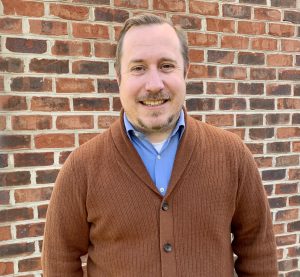Apr
19

Posted by randerson on April 19th, 2022
Posted in: NEC Profile
Tom Archibald is a decorated evaluator with an array of titles: associate professor, extension evaluation specialist, and graduate program director in the Agricultural, Leadership, and Community Education Department at Virginia Tech; chief of party of a USAID project in Senegal; board member of the American Evaluation Association; associate editor of the journal Evaluation and Program Planning; and he sits on the advisory board of the NNLM National Evaluation Center (NEC).
 Having worked in the field for a decade and a half, today he’s able to navigate the sometimes-heady evaluation jargon with ease — but his path to evaluation was indirect, falling essentially into an evaluation role.
Having worked in the field for a decade and a half, today he’s able to navigate the sometimes-heady evaluation jargon with ease — but his path to evaluation was indirect, falling essentially into an evaluation role.
“I actually consider myself an accidental evaluator,” he says, allying himself with many other evaluators who use this description.
Over 15 years ago, Archibald worked as an afterschool program manager but didn’t fully understand the evaluation components – more just as items to check off a list to show his boss. Then, when he was exploring graduate school, he came across a program in Cornell University’s Education Department in adult and extension education.
“I was interested in studying positive youth development and community-based participatory education, not evaluation,” Tom says, “But then a friend of mine sent me a posting for an assistantship, and it was in extension, but it was evaluation capacity building in extension. And I said, ‘I don’t know much about Evaluation Capacity Building, or ECB, but I know about extension, which is linked to the land-grant university system in American higher education.’ ”
He joined the team with expertise in extension and non-formal education and began working with a five-year project funded by the NSF that was operated out of the Cornell Office for Research on Evaluation. One of the first things Archibald discovered about the field was the fantastic breadth of evaluation as a profession.
“I really found a passion for ECB, working with non-evaluators to help them do more evaluative thinking. That was very in line with what I had experienced earlier in terms of participatory research and development, helping people unleash the power of inquiry to try to do what they’re doing even better to try to make the world a better place.”
It also gave him respect for the importance of epistemological politics, or the politics of knowledge, which he defines as: “In a nutshell, asking and engaging in the question of whose knowledge counts or even – pushing it one step further – whose reality counts.”
He shares that this is key. “Someone might not be an evaluator, but they know their community and they know their experience of the program and you can’t do good evaluation of a program unless you tap into those knowledges, that plurality of ways of knowing, about the program, about the context, about the outcomes, etcetera.”
He continues to devote time to the plurality of knowledge especially in the context of the idea of expertise and he wants to include as many ways of knowing in his work as possible, from many different groups of people.
To Archibald, it isn’t just the efficacy of the project at stake, but it’s ethicality. Working to uplift voices that aren’t normally included in evaluative conversations is one of his favorite parts of the job.
“When I get to do ECB, I love to help non-evaluators tap into their natural proclivity for evaluative thinking. I see their eyes light up and this ‘aha!’ moment where they realize they are already doing this. It’s about learning, about critical reflection, about questioning assumptions, about leveraging different types of what this program could be.”
Now it has come full circle – he teaches people to appreciate the very same work that he had once not understood. But this is not the only wonderful thing about the many titles and roles he now plays.
He loves his work and also enjoys spending time with his wife Nellie (“she deserves a shout out, I wouldn’t be here if it wasn’t for her”) and three daughters, Nisia (11), Esther (4) and Elishama (6 months).
“One of the things that brings me the most joy is walking in the woods with my daughters, because it combines two of my favorite things: spending time with them and the therapeutic aspect of being in nature.”
Written by Rosemary Sissel